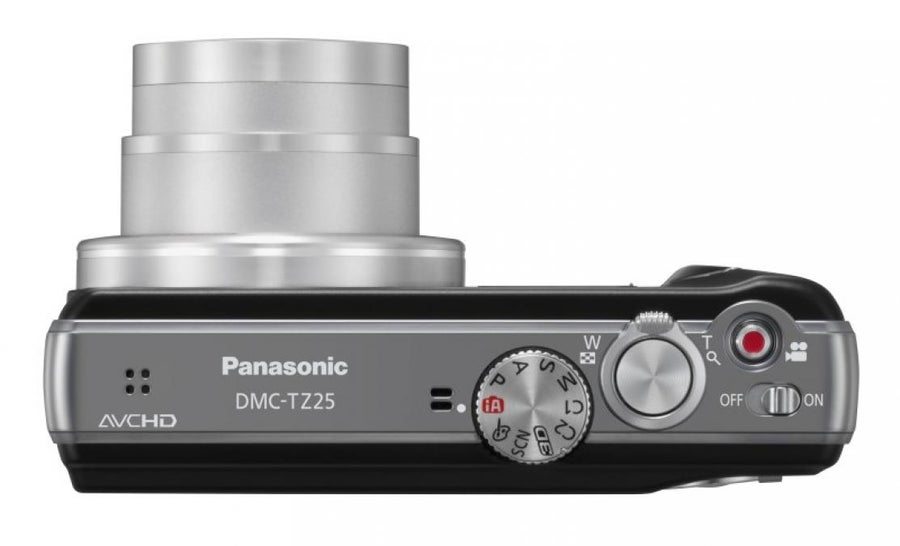Panasonic Lumix DMC-TZ25 review
Excels for image quality, video capture, performance and controls; at this price you can't go wrong
Specifications
1/2.3in 12.0-megapixel sensor, 16.0x zoom (24-384mm equivalent), 208g
For each of the last four years, Panasonic has launched two Travel Zoom (TZ) cameras: a flagship model packed with all its latest gadgetry and a lower-priced cut-down version. This year, Panasonic Lumix DMC-TZ30 gains a 20x zoom, 50fps video recording and a touchscreen, but the TZ25 inherits some impressive features of its own that were previously reserved for the flagship model.

One of these is 10fps burst shooting. The TZ25 has less buffer memory than the TZ30, so it’s only able to capture four frames at 10fps, but it was ready to go again after just three seconds. More significant is its ability to shoot at 5fps with continuous autofocus. It ran at 4.3fps in our tests, slowing to 1.9fps after five frames, but this is still a stellar achievement. It puts the TZ25 beyond all its rivals bar the TZ30 when it comes to capturing moving, distant subjects such as sports and wildlife.

It’s just as fast as the TZ30 in normal use, capturing a shot every 0.7 seconds. With most rivals bumbling along at around the two-second mark, this made a huge difference to day-to-day operation, letting us fire off a handful of shots without having to look in the continuous settings.
Another key upgrade is 1080p video recording. Panasonic backs this up with 30-minute clip lengths, outstanding image quality both indoors and out, plus a crisp, detailed soundtrack that’s virtually impervious to noises from the lens. Autofocus was responsive, and the optical stabilisation kept telephoto shots steady. The TZ30 goes one step further with its 50p capture, but until there are convenient ways to share video at this frame rate, the two cameras’ video modes are, to all intents and purposes, identical.

Their controls are virtually identical, too. There’s a mode dial for quick access to manual exposure settings, and scene presets such as 3D and panorama capture. There’s no wheel on the back, but the Q.Menu button lets you access key settings quickly. Sadly, it doesn’t have a touchscreen, which means that the autofocus point can’t be moved around the frame. Something that we didn’t notice on the TZ30 was Auto mode switching to HDR capture when it detected a strong backlight, capturing two frames and overlaying them to expose the foreground and background correctly. It’s a useful trick that worked extremely well but it slowed the camera so that it took six seconds between shots.
Basic Specifications | |
|---|---|
| Rating | ***** |
| CCD effective megapixels | 12.0 megapixels |
| CCD size | 1/2.3in |
| Viewfinder | none |
| Viewfinder magnification, coverage | N/A |
| LCD screen size | 3.0in |
| LCD screen resolution | 460,000 pixels |
| Articulated screen | No |
| Live view | Yes |
| Optical zoom | 16.0x |
| Zoom 35mm equivalent | 24-384mm |
| Image stabilisation | optical, lens based |
| Maximum image resolution | 4,000×3,000 |
| File formats | JPEG, MPO; AVCHD, MP4 (AVC) |
Physical | |
| Memory slot | SDXC |
| Mermory supplied | 70MB internal |
| Battery type | Li-ion |
| Battery Life (tested) | 260 shots |
| Connectivity | USB, AV, mini HDMI |
| Body material | metal |
| Lens mount | N/A |
| Focal length multiplier | N/A |
| Kit lens model name | N/A |
| Accessories | USB cable |
| Weight | 208g |
| Size | 61x105x34mm |
Buying Information | |
| Warranty | one-year RTB |
| Price | £249 |
| Supplier | http://www.amazon.co.uk |
| Details | www.panasonic.co.uk |
Camera Controls | |
| Exposure modes | program, shutter priority, aperture priority, manual |
| Shutter speed | 15 to 1/4,000 seconds |
| Aperture range | f/3.3-6.3 (wide), f/5.9-6.3 (tele) |
| ISO range (at full resolution) | 100 to 3200 |
| Exposure compensation | +/-2 EV |
| White balance | auto, 4 presets, manual |
| Additional image controls | i.Exposure |
| Manual focus | No |
| Closest macro focus | 3cm |
| Auto-focus modes | multi, centre, face detect, tracking |
| Metering modes | multi, centre-weighted, centre, face detect |
| Flash | auto, forced, suppressed, slow synchro, red-eye reduction |
| Drive modes | single, continuous, self-timer, panorama, HDR, 3D |










